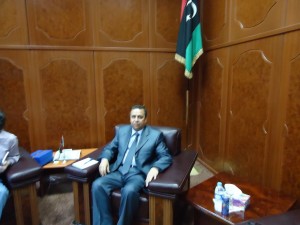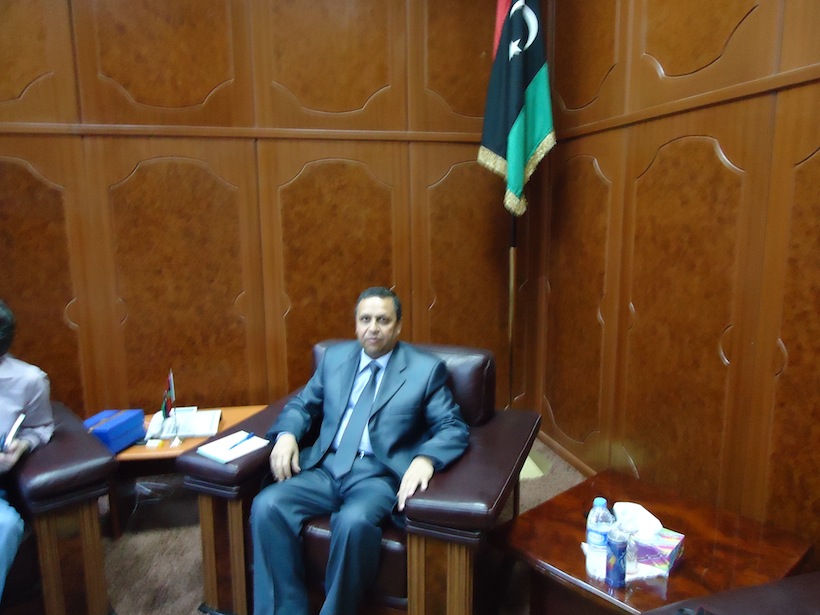Tripoli, 29 April:

Libyan Justice Minister Ali Humaida Ashour has spoken exclusively to Libya Herald’s Ashraf Abdul Wahab about the International Criminal Court’s . . .[restrict]demand for the handing over of Saif Al-Islam Qaddafi and the UK’s investigation into the 1984 murder of British policewoman Yvonne Fletcher.
Libya Herald: The ICC has refused Libya’s appeal to try Saif Al-Islam Qaddafi here in Libya. What is your reaction?
Humaida: The ICC sent a counsellor last March to assess the situation in Libya. After she had visited Saif Al-Islam in jail, and seen the conditions of his detention, she prepared a report in which she concluded that Libya is in control of the prisoner and demanded ICC to request his extradition.
Following that the ICC issued a decision obliging Libya to hand-over Saif Al-Islam to the ICC, a decision which was appealed against within the five day period specified by law.
The ICC issued a decision rejecting the appeal made by Libya in favour of their first resolution, which is to force Libya to hand over Saif Al-Islam to ICC. The previous decision has nothing to do with the new appeal, which will be lodged by Libya to the ICC on the 30th of April, because the newly-lodged appeal will question the ICC jurisdiction or admissibility. This will maintain that the ICC has no jurisdiction to try Saif Al-Islam, because the Libyan judiciary is competent to deal with this case and has precedence over other judicial systems and that the ICC judiciary is considered as supplementary.
Libya has, therefore, appointed some lawyers to prepare the appeal which will be presented on time. But unfortunately the 30th of April coincides with Holland’s public holiday and 1st May coincides with labourers’ holiday. But we, the Libyan government, insist on Saif’s trial taking place in Libya and according to the Libyan judiciary system.
Libya Herald: Does this mean that the lawyers’ mission is to support Libya’s position to hold Saif Qaddafi’s trial in Libya, and that the trial will be fair and transparent?
Humaida: The lawyers will be challenging ICC jurisdiction.
Libya Herald: Should we understand from your remarks that Saif Qaddafi’s trial in Libya depends on the situation and stability in Libya?
Humaida: The situation in Libya is now stable and under control and the Libyan judiciary system, as well as the Libyan Government are ready to hold the trial of Saif Qaddafi.
The ICC Prosecutor, Luis Moreno-Ocampo has visited Libya in the past few days and concluded that the Libyan judiciary is capable of trying Saif Qaddafi. The Libyan Government also confirmed that it ready and able to hold Saif Qaddafi’s trial and that it would be a fair and transparent trial in accordance with international laws and standards.
Libya Herald: We all know that the Libyan government has equipped courtrooms and cells, but what about the judges ? Will there be judges or counsellors from abroad and will there be any cooperation at a judicial level with foreign bodies?
Humaida: Yes, several courts and prisons in Tripoli were equipped and made ready and Saif Qaddafi will be transferred from Zintan to Tripoli to stand in Tripoli. As to the judiciary system, it has since been made independent of the executive body and, therefore, the Supreme Judicial Council will be appointing the judges.
Saif Qaddafi will tried by Libyan Judges and his trial will be public and have guarantees of all legal provisions. The trial will be attended by international organisations, international observers, journalists, media and human rights organisations. Therefore there will be no foreign judges in the trial.
Libya Herald: What are the charges that will brought against Saif Qaddafi ? Is any new legislation needed for his trial ? Will you seek help and use any outside laws?
Humaida: The only law which will be applied is the Libyan law. As for the charges which will brought against accused, they will include, wasting of public funds, violations against Libyan people such as killing, torture, rape and incitement to such acts.
Libya Herald: What proofs do you have of all these crimes?
Humaida: There is certainly enough evidence. It will be up to the Attorney General, to provide evidence against the accused to sustain the charges. Therefore, the public prosecutor is the authority to bring the charges against the accused and has the duty to provide evidence to convict the accused.
Libya Herald: Will there be a lawyer who will be in charge of defending Saif Al-Islam?
Humaida: Certainly. He will not be able to stand trial in Libya unless he has a defending lawyer, especially in the Criminal Court.
Libya Herald: When a British Minister recently visited Libya, did he offer to provide expert assistance or consultancy in respect of conducting the trial or to provide assistance with the development of the Libyan judiciary?
Humaida: All visitors who come to Libya at the moment offer the Libyan government help, aid and necessary assistance, because Libya is going through the process of building a state. As a government, we always strive for better cooperation between countries and to benefit from international experience, particularly with regard to training.
Libya Herald: Were there specific things offered to you in the fields of conducting trials and litigation training?
Humaida: Yes, we were offered help and we specifically asked for help in training members of the public prosecutor’s office and judicial police and judicial expertise, as well as research in criminal and forensic science. There has been cooperation between the Libyan and British governments in the fields of training members of the public prosecution, especially in learning the English language.
Libya Herald: There were talks recently about the cooperation between the British judicial authorities and Libyan authorities to reopen the investigation into the case of the British police officer Yvonne Fletcher. Are you ready to receive the British police investigators and provide them with all help needed to carry-out their investigations?
Humaida: There is agreement in place with the British authorities to cooperate in the investigation to uncover the truth and find out those behind this incident. And the Libyan government is seeking to find the truth and as such, there will be full cooperation between the Libyan and British sides, as well as a full coordination and cooperation between the Libyan and British Attorney Generals.
Libya Herald: Is this cooperation active now?
Ehmida: Yes.
Libya Herald: There is no sense that such cooperation has to wait for Libya’s transition from revolution to an established state?
Humaida: No.
Libya Herald: Does this mean, if the British investigators were to arrive tomorrow, the Libyan Attorney General will give them all help and support needed in order to conduct their investigations and accomplish their mission?
Humaida: Of course there must be coordination with the Ministry of Foreign Affairs and the Attorney General to prepare for their visit. We are ready to provide assistance and find the offenders or the accused to show the truth.
Libya Herald: The British government is saying that it is pressurising the Libyan government to start the investigations and that the Libyan government keeps saying it is not ready yet to provide help and assistance for the conduct of these investigations. Is it true that the British government is pressurising you to start investigations of the case?
Humaida: As previously said, there is coordination between the Libyan Attorney General and the British authorities on this side.
Libya Herald: The person accused is surnamed Sudani. It has been said he is being held by one of the militias. Is he still a suspect? Is he still being held by the same militia?
Humaida: The investigations and inquiries will reveal all this and who was behind this crime.
Libya Herald: Are there any suspects in this case at the moment?
Humaida: To my knowledge, there are no suspects in this investigation at the moment, but as I said previously, investigations will reveal all. [/restrict]







